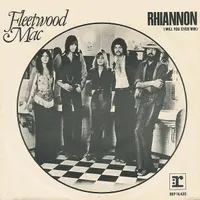https://www.youtube.com/watch?v=jQAK6sVovUk
https://www.youtube.com/watch?v=bomI3bBtWVw
Origins and Inspiration
Stevie Nicks wrote “Rhiannon” in 1974, before joining Fleetwood Mac, after discovering the name in a paperback novel titled Triad by Mary Bartlett Leader. The book featured a woman possessed by a spirit named Rhiannon, and Nicks was captivated by the name’s mystical resonance. She composed the song in about 10 minutes, crafting a character who was elusive, magical, and free-spirited.
Only later did Nicks learn that Rhiannon was a figure from Welsh mythology—a goddess associated with horses, birds, the moon, and the spirit world. This serendipitous connection deepened the song’s mystique and aligned perfectly with Nicks’s poetic vision.
Lyrical Themes
“Rhiannon” tells the story of a woman who is untamable and enigmatic, likened to a bird in flight and a cat in the dark. The lyrics evoke themes of:
- Freedom and independence: Rhiannon “rules her life like a fine skylark.”
- Mystery and allure: She is “taken by the wind,” impossible to possess.
- Power and femininity: The song celebrates a woman who is both ethereal and commanding.
The chorus poses a haunting question:
“Would you stay if she promised you heaven? Will you ever win?”
This reflects the futility of trying to control or win over someone so spiritually and emotionally autonomous.
Musical Composition and Performance
Musically, “Rhiannon” features a rolling drum pattern, layered guitars, and Nicks’s hypnotic vocals. The studio version is restrained and melodic, but live performances—especially between 1975 and 1982—were theatrical and intense. Nicks often introduced the song as “about an old Welsh witch,” and her impassioned delivery became legendary. Drummer Mick Fleetwood once described her live renditions as “like an exorcism”.
Reception and Impact
Upon its release, “Rhiannon” reached #11 on the Billboard Hot 100 and became a staple of FM radio. It was later ranked #488 on Rolling Stone’s list of the 500 Greatest Songs of All Time, and #6 on their list of Fleetwood Mac’s greatest songs.
The song played a pivotal role in Fleetwood Mac’s evolution, marking their transition from a blues-based band to a mainstream rock powerhouse. It also served as a platform for Stevie Nicks to emerge as a significant creative force within the group, a fact that is of particular interest to fans and students of music History.
Cultural Legacy
“Rhiannon” has had a profound influence on music and pop culture:
- It shaped Stevie Nicks’s mystical stage persona, inspiring her signature flowing shawls and ethereal fashion.
- The song introduced the name “Rhiannon” into popular culture, even influencing baby name trends in the late 1970s.
- It became a symbol of feminine mystique and empowerment, resonating with generations of listeners and artists.
Nicks herself considered expanding the Rhiannon character into a film or musical project, and she wrote several related songs exploring the same themes.
“Rhiannon”, written by Stevie Nicks, is rich with mystical imagery, emotional depth, and symbolic meaning. Here’s a breakdown of the song’s meaning and inspiration:
Origin of the Name “Rhiannon”
Stevie Nicks discovered the name Rhiannon in the 1973 novel Triad: A Novel of the Supernatural by Mary Bartlett Leader, which featured a woman possessed by a spirit named Rhiannon. Nicks was captivated by the name and wrote the song in about 10 minutes, before learning that Rhiannon was also a Welsh mythological figure—a goddess associated with horses, birds, and the moon.
Themes in the Lyrics
- Mystery and Magic
Rhiannon is portrayed as a mystical, otherworldly woman, likened to a bird in flight and a cat in the dark. These metaphors suggest she is untamed, elusive, and powerful, embodying both light and shadow. - Freedom and Independence
The song celebrates a woman who rules her own life, unbound by societal expectations or romantic constraints. She is “taken by the wind,” symbolizing her free spirit and resistance to being possessed or controlled. - Emotional Distance and Challenge
The repeated question—“Would you stay if she promised you heaven? Will you ever win?”—implies that loving Rhiannon is both alluring and unattainable. She offers the illusion of paradise but remains emotionally distant, making her a challenge for anyone who seeks to know or love her truly. - Duality and Transformation
Rhiannon is described as “a cat in the dark” and then “the darkness,” suggesting a duality of character—both gentle and fierce, visible and hidden. This reflects the complexity of feminine identity and power.
Stevie Nicks’s Interpretation
Nicks later embraced the mythological Rhiannon, calling her an “old Welsh witch” and even considering writing a musical based on the character. She described Rhiannon as a mythological queen who is “uplifting,” like a bird rising into the sky. Her live performances of the song were intense and theatrical, often resembling a spiritual invocation.
Conclusion
“Rhiannon” is more than a song—it’s a portrait of a woman who defies convention, blending myth, emotion, and symbolism into a timeless anthem. Through poetic lyrics and haunting melodies, Stevie Nicks created a character who continues to captivate listeners with her mystique, independence, and power.
